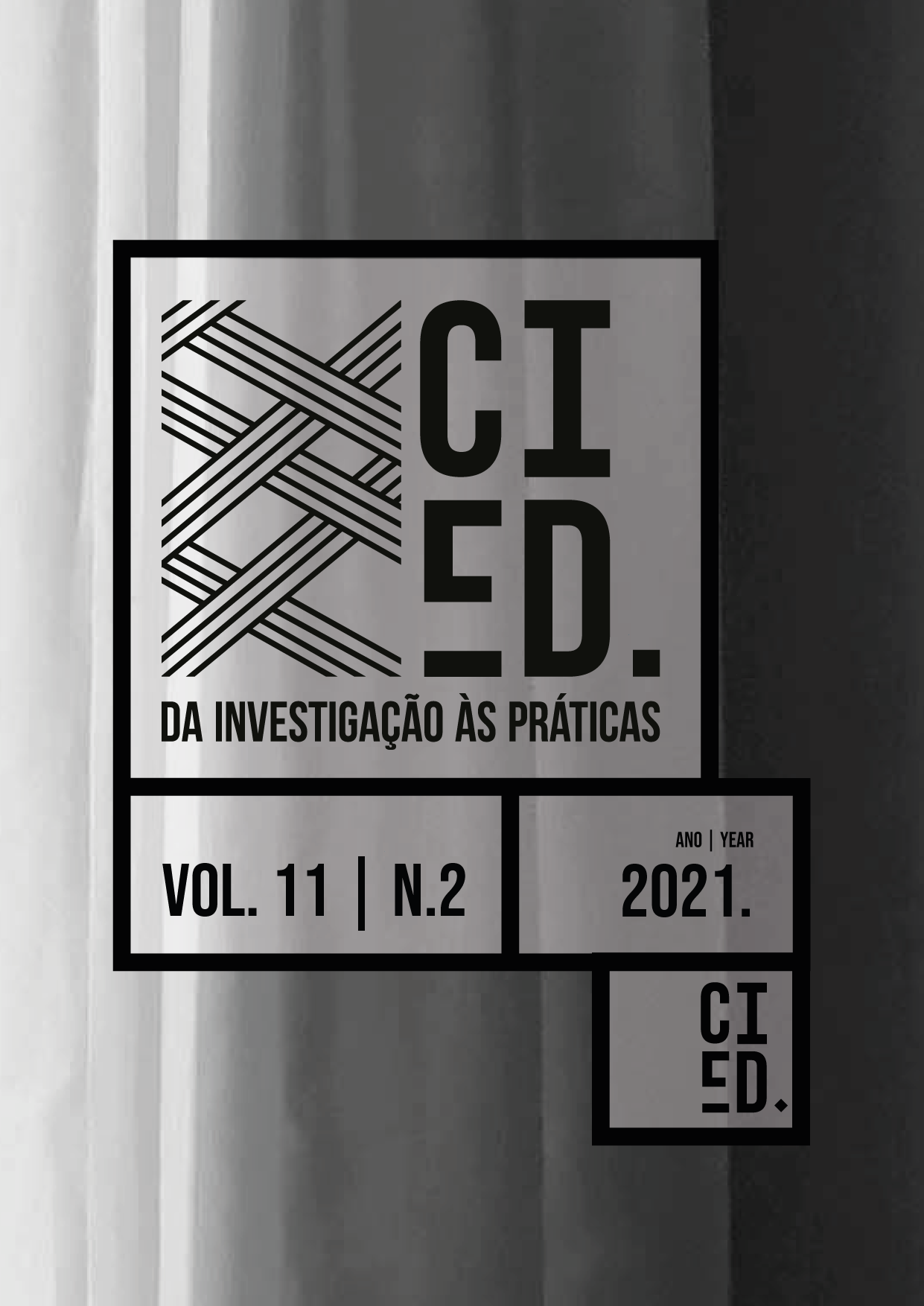Degree in Artistic and Cultural Mediation (ESELx – IPL): a critical analysis on the role of the mediator and mediation process in the Portuguese context
DOI:
https://doi.org/10.25757/invep.v11i2.268Abstract
The changes in the dynamics of the cultural sector in Portugal are increasingly evident creating a growing need to bring artists and cultural producers closer to the public. However, few professionals can develop this type of work resorting to a solid theoretical and technical background. These needs led to the creation of the degree in Artistic and Cultural Mediation in the 2016-2017 school year, at the Lisbon School of Education (Polytechnic Institute). This undergraduate program aims to train professionals who can establish a relationship between cultural producers and the public by developing work strategies effective in hybrid territories that combine different but complementary features such as education, programming, creative and artistic processes, assuming their integrative role. After the graduation of the first students, it is important to reflect on the several aspects that influence the development of this degree and what is its contribution to cultural democracy and democratization in Portugal.
Downloads
References
Centeno, M. J. (2011). As políticas e práticas culturais no seio da Rede Nacional de Teatros e Cineteatros. In J. Azevedo & M. de L. Martins (Eds.), Meios digitais e indústrias criativas: os efeitos e os desafios da globalização: Livro de atas: 7o CONGRESSO SOPCOM (pp. 432–442). Porto: Universidade do Porto-Faculdade de Letras/SOPCOM.
Damasceno, J. (2010). Museus para o povo português. Coimbra: Imprensa da Universidade de Coimbra.
Ferreira, L. S. (2019). Cultivar. In T. Fradique (Ed.), O público vai ao Teatro (pp. 114–124). Maia: Teatro Meia Volta e Depois à Esquerda Quando Eu Disser.
Ferreira, N. M. (2018). A Escola Normal Primária de Lisboa em Benfica: 1916-1930. Lisboa: Livros Horizonte.
Gattinger, M. (2011). The democratization of Culture, Cultural Diplomacy and Governance. Canadian Public Arts Funders (CPAF) Annual General Meeting, 3–7. Retrieved from https://pdfs.semanticscholar.org/6d44/6013f265c122576061540749842446b27e74.pdf
Giménez, C. (2010). Mediação Intercultural. In Cadernos de apoio à formação (Vol. 4). Lisboa: Alto Comissariado para o Diálogo Intercultural.
Gomes, R. T., & Lourenço, V. (2009). Democratização Cultural e Formação de Públicos: Inquérito aos “Serviços Educativos” em Portugal. Lisboa: Observatório das Actividades Culturais.
Hadley, S., & Belfiore, E. (2018). Cultural democracy and cultural policy. Cultural Trends, 27(3), 218–223. https://doi.org/10.1080/09548963.2018.1474009
Henry, P. (2014). Un nouveau référentiel pour la culture? Toulouse: Editions de l’Attribut.
Kelly, O. (1984). Community, Art & the State: Storming the Citadels. London: Comedia Publishing Group.
Laaksonen, A. (2010). Making culture accessible: Access, participation and cultural provision in the context of cultural rights in Europe. Retrieved from http://sgpwe.izt.uam.mx/files/users/uami/ana/LaaksonenMakingCultAccesible.pdf
Lopes, J. T. (2009). Da democratização da Cultura a um conceito e prática alternativos de Democracia Cultural (No. 14).
Lussier, M. (2015). L’appropriation de la médiation culturelle dans la Vallée-du-Haut-Saint-Laurent : caractéristiques, besoins e enjeux des artistes et des travailleurs culturels. Montréal: Culture pour tous, Autour de Nous et Service aux collectivités de l’UQAM.
Matarasso, F., & Landry, C. (1999). 12 Balancing act: twenty-one strategic dilemmas in cultural policy. Retrieved from https://books.google.co.uk/books?hl=en&lr=&id=mufg31vHyfoC&oi=fnd&pg=PA7&dq=Balancing+act+:+twenty-one+strategic+dilemmas+in+cultural+policy+matarasso&ots=K4ceUulJ0t&sig=Y2Ljba1TqYhSrDlJadJPfe4F7X0&redir_esc=y#v=onepage&q=Balancing act %3A twenty-one stra
Mateus, A., Primitivo, S., Caetano, A., Barbado, A., & Cabral, I. (2010). O sector cultural e recreativo em Portugal - Sumário executivo. Lisboa.
Mörsch, C., & Holland, A. (2015). Time for cultural mediation. Retrieved from https://www.kultur-vermittlung.ch/zeit-fuer-vermittlung/index.html
Portela, A. (1987). Salazarismo e Artes Plásticas. Lisboa: Instituto da Cultura e Língua Portuguesa - Ministério da Educação.
Vlachou, M. (2019). Anfi-teatro. In T. Fradique (Ed.), O público vai ao Teatro (pp. 105–111). Maia: Teatro Meia Volta e Depois à Esquerda Quando Eu Disser.
Vohlgemuth, L., Campos, J., Martins, C., Gama, A., Dias, A., Hortas, M. J., & Vieira, N. (2017). Quelles médiations dans les formations offertes par l’ESELx : l’ASC et ses frontières? L’animation Socioculturelle : Quels Rapports à La Médiation ? - ISIAT. Bordeaux.
Xavier, J. B. (2016). As artes e a cultura no fio da navalha. In J. B. Xavier (Ed.), A cultura na vida de todos os dias (pp. 17–32). Porto Editora.
Downloads
Published
How to Cite
Issue
Section
License
Copyright (c) 2021 Cristina Barroso Cruz, Natália Vieira, Laurence Vohlgemuth

This work is licensed under a Creative Commons Attribution-NonCommercial-NoDerivatives 4.0 International License.
Articles published or submitted to Da Investigação às Práticas are licensed according to Creative Commons Attribution License (CC BY 4.0). Authors agree that:
Copyrights of all articles published are retained by authors with first publication copyright granted to the journal.
All articles are under the Creative Commons Attribution License recognizing the authorship of the publication and identifying that first publication took place in this journal.
Authors have the right to free distribute or make available in private or institutional pages the version published by Da Investigação às Práticas: Estudos de Natureza Educacional provided the original proper citation.
The journal only accepts articles not published previously (except in the form of an abstract or as part of academic thesis), that it is not under consideration for publication elsewhere. After published, the article cannot be published again partial or totally without the editorial board consent.





 e-ISSN: 2182-1372
e-ISSN: 2182-1372